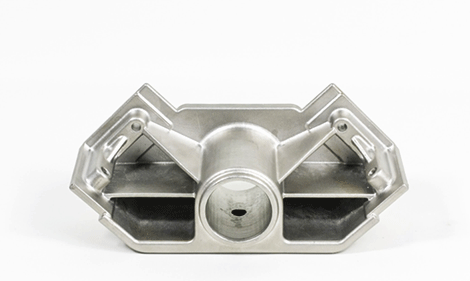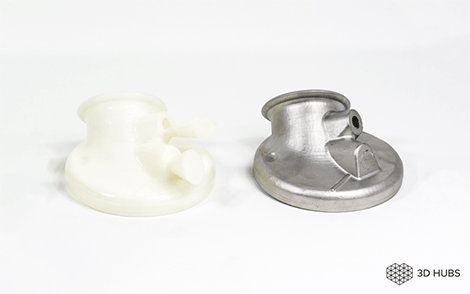
3D Hubs has partnered with castable materials producer Polycast and localised foundries to produce parts at low cost
3D Hubs has announced it is bringing low cost metal parts to market through its online marketplace by utilising FDM printed patterns and a global network of foundries.
With material costs for the patterns being low, the metal parts should become particularly price competitive as part sizes increase, allowing 3D Hubs to estimate prices five-times cheaper than traditional manufacture.
‘A useful rule of thumb’ explains 3D Hubs, ‘is that if a design is approaching the size of a basketball, FDM printed patterns become the most cost effective method for producing custom metal parts with complex geometries’.
The journey of the metal part begins with the pattern being 3D printed on an FDM machine by a 3D Hubs printing service. The 3D printed pattern is then polished using Polymaker’s Isopropanol micro droplet technology ensuring clean surface molds ready for casting.
This process stops small air bubbles getting trapped on the surface of the ceramic mold which will transfer to the metal parts.
The pattern is then sent to a local foundry for investment casting. After casting, parts with critical tolerances are then machined before being sent out out to the end user.
Traditionally, the investment casting process uses a machined die to produce wax patterns for casting. 3D Hubs becomes the first company to use FDM castable plastic to create these patterns, with the perceived benefits, besides its low cost, of FDM printing allowing for the production of large, complex patterns that traditional manufacturing techniques would have difficulty producing.

The FDM 3D printed part, and the final cast metal part
“Most polymers leave residues when they decompose during the pattern burnout process. We have engineered the material to ensure that it decomposes completely at T > 600 ºC, leaving a clean mold ready for casting,” said Polymaker president Xiaofan Luo.
The process from order to finished part will be managed end-to-end by the 3D Hubs team of in-house 3D printing experts, with customers only needing to provide their 3D files and material choice – from a range of stainless steel, brass, copper, aluminum and bronze with more to follow.
“Our customers have expressed a strong interest in large metal parts, so we’re excited to launch this innovative service on three continents and to provide them the solution they’re looking for,” said 3D Hubs CEO Bram de Zwart.






